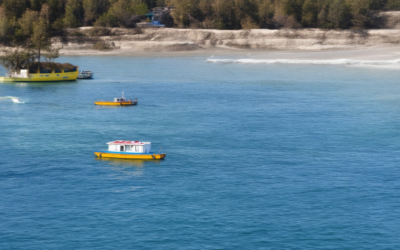Volunteer Placements for Travelers: Everything You Need to Know About Costs, Locations, and More
Are you eager to combine your love for travel with a desire to give back? Volunteering while traveling presents a unique opportunity to explore new destinations while contributing to meaningful causes. Whether you’re seeking free international volunteer programs or paid missions, there are countless ways to integrate service into your travels. This guide delves into the ins and outs of volunteer placements for travelers, covering costs, locations, and tips to help you find the perfect fit for your adventure. From short-term projects to long-term commitments, we’ll explore how you can volunteer abroad for free or with all expenses covered, while discovering the best destinations and programs available in 2021.

How to Volunteer While Traveling
Volunteering while traveling offers a unique way to give back to the community and explore new destinations. Here’s a step-by-step guide to help you get started:
1. Find International Volunteer Opportunities
Look for reputable organizations that operate globally. Many NGOs and charities offer volunteer programs that may cover travel expenses, accommodation, and meals. Consider organizations focused on humanitarian aid, environmental conservation, or community development.
Popular Platforms and Resources:
- Volunteer Abroad – Connect with international volunteer opportunities
- Workaway – Offers immersive volunteer experiences with host families
- WWOOF – World Wide Opportunities on Organic Farms
- VolunteerMatch – Find volunteer opportunities worldwide
2. Prepare Thoroughly Before Departure
Before embarking on your journey, ensure you’re well-prepared:
- Learn Basic Language Skills: Knowing the local language can enhance your volunteer experience and help you integrate better.
- Cultural Awareness: Familiarize yourself with local customs, traditions, and social norms.
- Medical Preparation: Carry essential medications and understand basic health protocols in the region.
3. Stay Safe During Your Trip
Safety is paramount. Take the following precautions:
- Register Your Itinerary: Inform your embassy or consulate and share your plans with a trusted contact.
- Be Mindful of Surroundings: Avoid crowded areas and exercise caution with personal belongings.
- Know Emergency Contacts: Keep a list of local emergency numbers handy.
4. Engage with Local Communities
When you arrive, immerse yourself in the local culture:
- Join Group Trips: Consider joining organized volunteer groups for guided experiences and support.
- Explore Independently: Allocate time for personal exploration and community engagement.
5. Stay Connected and Share Your Experience
Document your journey and share your story:
- Update Social Media: Keep friends and family informed and inspired.
- Capture Memories: Use photos and videos to reflect on your experience.
6. Reflect and Provide Feedback
Upon return, reflect on your experience:
- Write About Your Journey: Journal your thoughts and feelings for personal growth.
- Share Feedback: Offer constructive criticism to improve volunteer programs and obtain a reference letter.
7. Manage Expectations and Budget
Plan financially and realistically:
- Determine Duration: Choose between short-term or long-term commitments based on availability.
- Budget for Costs: Factor in program fees and daily expenses.
8. Pack Appropriately and Respectfully
Ensure you’re ready for the adventure:
- Pack Essentials: Bring comfortable clothing, reusable items, and necessary documents.
- Respect Local Customs: Adhere to cultural norms and practices during your stay.
By following these steps, you’ll be well-equipped to volunteer while traveling, making meaningful connections and contributions along the way.
What is it called when you travel to volunteer?
It is called voluntourism . This unique concept combines the excitement of traveling with the rewarding experience of volunteering. By participating in voluntourism, individuals can explore new destinations while contributing to meaningful community projects.
Types of Voluntourism Opportunities
- Short-Term Projects: These often last a week or two, ideal for those looking for a quick yet impactful trip.
- Long-Term Commitments: Some programs require a commitment of several months, allowing deeper immersion into the community.
- Cultural Exchange: Voluntourists gain exposure to diverse cultures while providing assistance where it’s needed most.
The Impact of Voluntourism
Voluntourism benefits both travelers and host communities. It offers a fulfilling way to give back while discovering new places. Participants often return with a greater appreciation for cultural diversity and the power of collective action.
How to Get Started
To embark on a voluntourism journey, research reputable organizations that align with your interests. Well-known platforms include:
These platforms connect volunteers with meaningful opportunities worldwide, ensuring a seamless and impactful experience.

Is It Possible to Volunteer Abroad for Free?
Yes, it is possible to volunteer abroad for free, though the opportunities may vary depending on the organization, location, and type of work. Many international volunteer organizations offer free programs, often covering accommodation, meals, and transportation as part of the service.
Steps to Find Free Volunteer Opportunities Abroad
- Research Volunteer Organizations: Look for reputable platforms like World Wide Volunteers or Volunteer Abroad . These sites often list free opportunities based on your skills and interests.
- Check Non-Profit Websites: Visit the websites of non-profits and NGOs operating globally. Many of these organizations have free volunteer programs available on their platforms.
- Join Volunteer Matching Platforms: Sign up for platforms like Volunteer Connect or Global Volunteer to find local and international opportunities.
- Reach Out to NGOs Directly: Contact international NGOs directly through their websites or social media channels. Many organizations accept volunteers on a sliding scale or completely free basis.
- Consider Cultural Exchange Programs: Some organizations offer cultural exchange programs where you volunteer in exchange for accommodation and meals. Examples include Workaway and WWOOF .
What to Expect
When volunteering abroad for free, be prepared for a commitment of time and effort. Many programs require a minimum stay duration, and you may be asked to contribute to daily tasks as part of your volunteer work.
How to Prepare
- Research the Country and Organization: Make sure the country and organization align with your goals and values.
- Learn Basic Language Skills: While many programs offer English-speaking opportunities, learning a few local phrases can greatly enhance your experience.
- Secure Necessary Documents: Apply for the necessary visas or permits if required. Carry important documents like passport and insurance.
- Pack Appropriately: Bring clothing suitable for the climate and activities you’ll be involved in.
By exploring these avenues, you can find meaningful volunteer opportunities abroad that fit within your budget. Remember to prioritize organizations whose missions resonate with you and ensure your participation aligns with their needs and expectations.

How Much Does It Cost to Go on a Humanitarian Trip?
The cost of participating in a humanitarian trip can vary significantly depending on the organization, destination, duration, and type of work. Here’s a breakdown of some common options:
-
Nations Outreach : Offers group trips ranging from $750 to $1,500 per person, depending on the destination. This includes the Dominican Republic, Kosovo, and Uganda.
-
Global Volunteers : Typically charges between $650 and $1,200 per person, with destinations including Nepal, Ghana, and the Philippines.
-
World Relief : Fees generally range from $400 to $900 per person, with opportunities available worldwide based on specific project needs.
Factors Influencing Costs: – Airfare : Not usually included in the trip fee.- Accommodation and Meals : Varies by organization; some provide these, while others do not.- Duration : Longer trips may incur higher costs due to extended stays.- Group Discounts : Many organizations offer reduced rates for team bookings or repeat volunteers.
Tips for Budgeting: – Apply early to secure spots, as many trips are filled quickly.- Check for group discounts or special rates for returning volunteers.- Consider the nature of your work—construction projects may cost more than educational programs.
Research thoroughly and contact organizations directly to find the best fit for your preferences and budget.
What Qualifies as Humanitarian Travel?
Humanitarian travel refers to international travel aimed at providing aid, support, or assistance to communities affected by conflict, disaster, or social instability. This type of travel is typically organized through non-governmental organizations (NGOs), international aid groups, or volunteer networks.
Common Activities Associated with Humanitarian Travel
- Volunteering in disaster relief efforts
- Supporting education and healthcare initiatives
- Constructing infrastructure like schools and clinics
- Agricultural support and food distribution
- Environmental conservation and sustainable development
Causes Often Addressed Through Humanitarian Travel
- Education and literacy programs
- Disaster response and recovery
- Healthcare and medical aid
- Infrastructure development
- Environmental sustainability projects
Why People Engage in Humanitarian Travel
- Desire to contribute to global causes
- Gaining hands-on experience in development work
- Personal growth and skill development
- Fulfilling a sense of purpose and empathy
Key Considerations for Humanitarian Travelers
- Research and partner with reputable organizations
- Ensure proper vaccination and health preparations
- Understand and respect local customs and laws
- Secure necessary permits and visas
- Align actions with the host country’s priorities
Getting Started with Humanitarian Travel
- Volunteer with established NGOs or international aid agencies
- Join volunteer platforms and networks
- Participate in organized group trips
- Seek advice from experienced travelers or mentors

Do You Get Paid to Go on Mission Trips?
Yes, there are various ways to get paid for participating in mission trips, depending on the type of trip and the organization organizing it. Here are some common scenarios:
- Volunteer Missions: Many volunteer missions are unpaid, though some organizations may offer stipends or cover travel expenses. These trips are often focused on community service, education, or environmental conservation.
- Remote Work Missions: Some companies send employees on mission trips as part of remote work programs. These trips may be paid, with compensation ranging from per diem rates to full salaries, depending on the length and nature of the assignment.
- Influencer and Content Creation Missions: Influencers and content creators may be compensated for documenting their experiences on mission trips. This could involve sponsored trips or partnerships with brands looking to promote their products or services.
- Adventure and Expedition Missions: Some adventure companies offer paid mission trips where participants are reimbursed or paid for their efforts, particularly in high-risk or challenging environments.
To find paid mission trip opportunities, consider exploring platforms and organizations that specialize in international travel, volunteer work, or remote employment. Many of these groups have partnerships with companies willing to compensate participants for their contributions.
Additionally, many mission trips are designed to combine travel with professional development, allowing participants to earn continuing education credits or gain valuable experience that can translate into future job opportunities.
Conclusion: While mission trips can sometimes be unpaid, there are certainly opportunities to get compensated for your participation, especially if the trip is tied to professional work, remote employment, or influencer collaborations. Research specific organizations and programs to find the best fit for your skills and interests.


0 Comments